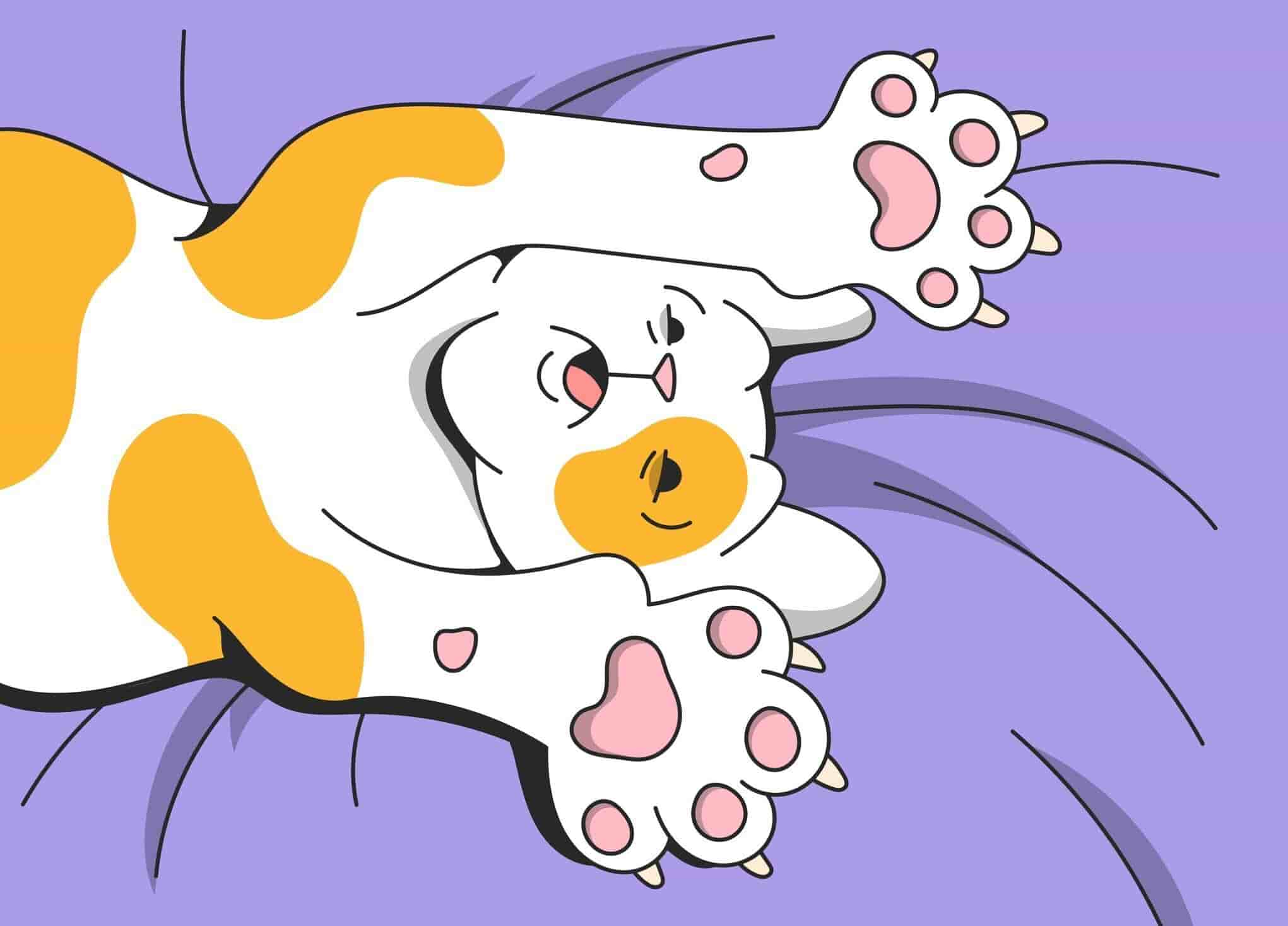Experts can’t really agree on whether or not cats can get ADHD, also known as Attention Deficit Hyperactivity Disorder. It is a condition that is quite common amongst adults and children across the globe, but it is not yet definitively known whether cats and other animals can experience the same.
This article was reviewed by our expert veterinarian, Chris Vanderhoof (DMV).
Stop Googling - Ask a Real Vet
What is ADHD?
ADHD, also known as Attention Deficit Hyperactivity Disorder, is just as the name would suggest: a deficit of attention, teamed with hyperactivity. It is classed as a neurodevelopmental disorder, and it is not yet fully understood – either in humans or in animals.
Can Cats Have ADHD?
While some vets and animal experts seem to agree that cats can get ADHD, the condition isn't recognized by all.
Cats can exhibit symptoms or personality and behavioral traits that are often linked to ADHD in humans, especially human children. Diagnosing the condition is renowned for being difficult in humans, and it is even more difficult to diagnose in animals, particularly unpredictable creatures like cats.
Adding to the difficulty of diagnosis is that many medical conditions can lead to behavioral changes in cats that may be confused with a behavioral disorder. Hyperthyroidism for example, can lead to signs of hyperactivity and any condition causing pain or discomfort may lead to disengaged or irritable behavior in cats.
If medical causes have been ruled out by your veterinarian, the best way to have cats assessed for a hyperactive disorder is to have them evaluated by a veterinarian who specializes in behavior, also called a board-certified veterinary behaviorist.
The behavior of the cat will likely need to be monitored for many months. A vet may recommend installing a pet camera, just like Petcube’s interactive cat camera, to assist. In doing so, you can watch and/or playback video footage of your feline friend throughout the day, making a note of any odd or unusual patterns of behavior.
Read more: 13 Things Your Pet is Secretly Doing When You're Not Home
Genetic influences and factors are often involved when diagnosing ADHD in human children, and it could be the case that adult cats pass cat ADHD to their kittens.
What Are the Symptoms of ADHD in Cats?
ADHD can present itself rather differently in cats than in humans, and it can also change dramatically from one cat to another. This is what makes the condition difficult to diagnose. This is also why some experts do not believe it should be a recognized feline condition.
In some ways, ADHD may be easier to diagnose in older cats. When a cat with ADHD is going through a hyperactive period, they will often zoom around the house faster than most kittens. Adult cats are usually a bit lazier by nature and would much prefer to sleep than exert themselves too much.
As well as being hyperactive and playful, cats of all ages can display the following symptoms if they have cat ADHD:
- Very impulsive behavior;
- Happy and loving one minute, angry and defensive the next, for seemingly no reason;
- Love and affection time is dictated by them and not you, always;
- Sleeping longer than average/other cats;
- Refusal to eat anything other than one or two particular brands of food;
- Refusal to eat when food is changed;
- Refusal to use the litter tray when the litter is changed;
- Focusing on specific things, weirdly, for prolonged periods of time;
- Defiance beyond the usual cat-level of defiance;
- Chasing people/other animals;
- Being very vocal;
- Bounding and leaping across surfaces and furniture (including the ones they’re not allowed on).
In all honesty, this behavior is displayed by most cats to some extent – which is proof again of just how difficult ADHD in cats is to diagnose. Some cats are hyperactive cats by nature, and some aren’t.
How Long is the Attention Span of a Cat?
This is another question that is up for debate. It is thought that a cat has an attention span of somewhere between two and fifteen minutes, but some experts argue that it can be a lot longer than that. And we’ve all seen a cat stare at the same blank patch on the wall for half an hour, for no apparent, reason… right?
There is also one caveat: cats will have a longer attention span for food-related items or activities, quickly becoming bored or disinterested in activities or objects that don’t impress them.
In short: cats, no matter the age, are pretty much exactly the same as the average human toddler.
Why Is My Kitten So Hyper?
Kittens, much like human children, are generally and naturally hyper and more active when you compare them to adults. The latter has usually slowed down a bit, will sleep more, and will prefer an easier, quieter life.
All kittens are different, though. One kitten in a litter can zoom around the house at the speed of light for 18 hours a day, whereas another kitten from the same litter will have a burst of five-minute zoomies and then not move for the rest of the afternoon.
Kittens are more hyper because they are learning so much, have a lot more energy, and aren’t lugging around tired, old bodies. Lots of things can cause a previously calm kitten to turn hyper, however. These include:
- Fear;
- Overstimulation;
- Boredom;
- Exercising/practicing predatory instincts;
- Excitement;
- Post-sleep pent-up energy.
Read more: Kitten Care 101 - How to Take Care of a New Kitten
What Can I Do about a Hyperactive Cat?
If you believe that your cat or kitten does have ADHD, it's important to first work with your vet to rule out any possible medical disorders that may be affecting your cat's behavior. If a behavior disorder is then suspected, whether or not you are able to get a true diagnosis of ADHD, there are things that you can do at home to make your furry friend more comfortable
Pay attention to the way they react to certain foods or litter (for example). If they only happily eat one brand or type, try to stick to that one brand or type. Cats don’t like change at the best of times, but cats with ADHD can really struggle with it.
For the most part, the way you can best help your cat will depend on the way your cat behaves. If they like to play all night, make sure your furry friend has access to toys all throughout the night, to keep them stimulated and not bored. Battery-operated toys are a great idea, as well as toys with feathers, bright colors, and textures.
Just remember: anything that makes a noise while your cat plays with it, is likely to wake you up.
If your pampered pet is a sucker for a treat, toys that incorporate treats are a great idea. There are plenty of styles and varieties on the market – balls that release treats when they are rolled around, toys that release treats when simple puzzles are solved, etc.
You can take some tricks from parents of children with ADHD to make life easier for both you and your cat. This includes trying to stick to some sort of structured routine. This isn’t always possible, of course, but keeping bedtime, feeding, and outdoor times as stable and consistent as you can.
All cat-related items, such as bed(s) and food bowls should remain in the same place. Moving them around will confuse and potentially distress your cat, which can agitate ADHD further.
The very best way to help your cat with ADHD is to get to know them better. Learn what they like and don’t like, and how they react to certain situations or circumstances. Only then can you truly know what to do for your pet to ensure they are happy and healthy.
Still Have Concerns? You Need Petcube’s Online Vet Service!
Would you like access to an emergency fund of $3,000 for up to 6 pets, under a single plan – and all for less than $30 a month? That’s exactly what Petcube is offering - fast coverage payment, and a team of qualified and professional vets available online 24 hours a day, 7 days a week.
It doesn’t matter what you’re worried about – a new case of cat ADHD, an insect sting, or a broken bone – Petcube has your back, and your furry friend’s back, too!
FAQ
Can Cats Have ADD?
It is not yet known whether or not cats can have ADD or ADHD, but investigations are ongoing, and many vets and experts DO believe it should be a recognized feline condition.
What is Hyperactive Kitten Syndrome?
Also known as feline hyperesthesia syndrome, hyperactive kitten syndrome is another condition that has experts and vets in disagreement. First mentioned and reported back in the early 80s, it can affect cats of all ages and is not yet fully understood or recognized by all vets.

Was this article helpful?
Help us make our articles even better









